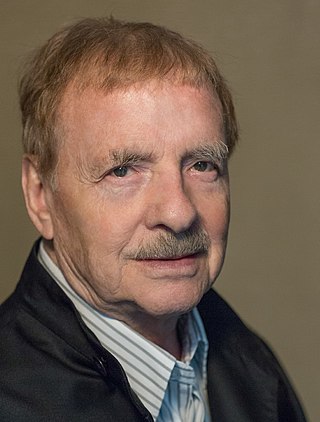Related Research Articles

Claude Fournier was a Canadian film director, screenwriter, editor and cinematographer. He is one of the forerunners of the Cinema of Quebec. He was the twin brother of Guy Fournier.

Here and Now is a 1970 French-Canadian film directed by Denis Héroux. The film is seen as a sequel to Valérie also directed by Héroux. The film has been called maple syrup porn. L’Initiation grossed more money than its predecessor, making it one of the highest-grossing Canadian films at the domestic box office.

Chloé Robichaud is a Canadian director best known for her debut film Sarah Prefers to Run. The film premiered at the 2013 Cannes Film Festival in the Un Certain Regard section.
Québec Cinéma presents an annual award for Best Actress to recognize the best in the Cinema of Quebec.
Québec Cinéma presents an annual award for Best Actor to recognize the best in the Cinema of Quebec.
Québec Cinéma presents an annual award for Best Supporting Actor to recognize the best in the Cinema of Quebec.
Québec Cinéma presents an annual award for Best Director to recognize the best in the Cinema of Quebec.
The 22nd Quebec Cinema Awards were presented on 10 June 2020, to recognize talent and achievement in the cinema of Quebec. The planned 7 June ceremony was cancelled due to the COVID-19 pandemic, but nominees were announced 23 April. Abenaki documentary filmmaker Alanis Obomsawin was also selected as the recipient of the Iris Tribute at the unanimous recommendation of Québec Cinéma's Comité de représentation professionnelle.

I'll End Up in Jail is a Canadian short drama film, directed by Alexandre Dostie and released in 2019. The film stars Martine Francke as an unhappy housewife who is attempting to escape her life, when she arrives at the scene of a fatal car accident and is convinced by its perpetrator Jelly to help him try to hide the dead body in the forest.
Mathieu Laverdière is a Canadian cinematographer. He is a two-time winner at the Prix Iris, winning Best Cinematography at the 23rd Quebec Cinema Awards in 2021 for Underground (Souterrain), and Best Cinematography in a Documentary at the 26th Quebec Cinema Awards in 2024 for Mother Saigon.

A Woman, My Mother is a Canadian documentary film, directed by Claude Demers and released in 2019. The film documents Demers's efforts to learn more about his birth mother, who gave him up for adoption but later died before Demers ever had the opportunity to meet her as an adult, leaving him with many gaps in his understanding that he could fill in only with imaginative speculation.
The Prix Michel-Côté is an annual film award, presented by Québec Cinéma as part of its annual Prix Iris, to honour the most popular film of the year among film audiences in Quebec.
The Iris Tribute Award is an annual award presented by Québec Cinéma, as part of its Prix Iris program, as a lifetime achievement award for distinguished accomplishments in the Cinema of Quebec.
The Prix Iris for Best Documentary Film is an annual film award presented by Québec Cinéma as part of its Prix Iris program, to honour the year's best documentary film made within the cinema of Quebec.
The Prix Iris for Best First Film is an annual film award, presented by Québec Cinéma as part of its Prix Iris awards program, to honour the year's best debut film made within the Cinema of Quebec.
One Summer is a 2023 Canadian comedy-drama film, directed by Louise Archambault.
My Mother's Men is a Canadian drama film, directed by Anik Jean and released in 2023. The film stars Léane Labrèche-Dor as Elsie, a woman who is fulfilling her recently deceased mother Anne's wishes that a portion of her ashes be given to each of her ex-husbands.
Juliette Gariépy is a Canadian actress and model from Quebec. She attracted critical acclaim for her performance in the independent feature film Red Rooms , for which she won the Prix Iris for Revelation of the Year at the 25th Quebec Cinema Awards in 2023, and received a Canadian Screen Award nomination for Best Lead Performance in a Drama Film at the 12th Canadian Screen Awards in 2024.
Two Women is a Canadian sex comedy film, directed by Chloé Robichaud and slated for release in 2025. A modernized remake of Claude Fournier's influential 1970 comedy film Two Women in Gold, the film stars Karine Gonthier-Hyndman and Laurence Leboeuf as Florence and Violette, two unfulfilled suburban mothers who begin to reevaluate their life priorities after Florence engages in an extramarital affair.
References
- ↑ Gerald Pratley, A Century of Canadian Cinema. Lynx Images, 2003. ISBN 1-894073-21-5. p. 227.
- 1 2 Turner 1987, p. 95.
- ↑ Melnyk 2004, p. 137.
- ↑ Charles-Henri Ramond, "Deux femmes en or – Film de Claude Fournier". Films du Québec, January 19, 2009.
- ↑ Malcolm Reid, "Quebec film makers look to the commercial". The Globe and Mail , August 7, 1970.
- ↑ André Duchesne, "Deux femmes en or: au-delà des parties de fesses". La Presse , May 16, 2020.
- ↑ Maxime Demers, "Une nouvelle version de Deux femmes en or financée par la SODEC". Le Journal de Montréal , December 19, 2022.
- ↑ Maxime Demers, "Le film «Deux femmes en or», de Chloé Robichaud, sera présenté en première mondiale au Festival de Sundance". Le Journal de Montréal , December 11, 2024.